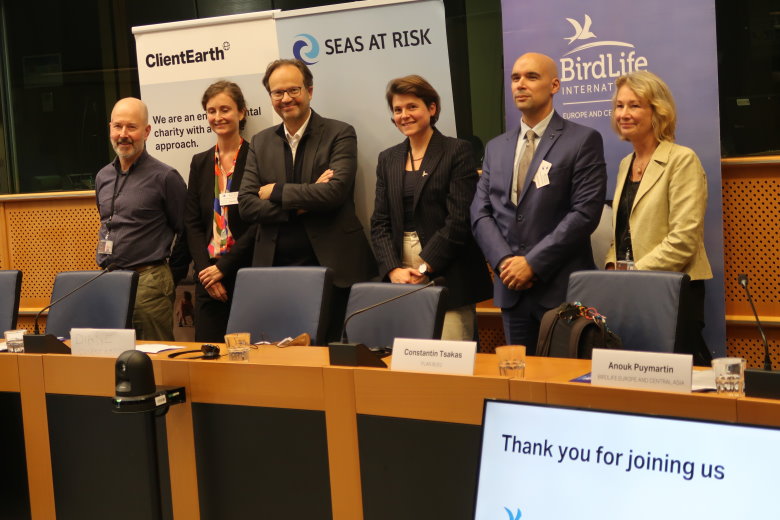One of the hottest topics in the European Union (EU) these days is the proposal for the next Multiannual Financial Framework (MFF, 2028-2034 ) published by the Commission in President Ursula von der Leyen’s second term. MEP Stéphanie Yon-Courtin of the Renew Europe group, Vice Chair of the European Parliament’s Fisheries Committee, had invited to a debate on this crucial topic right at the beginning of the EU Ocean Week on 14 October 2025. This event was organised by Birdlife International, Seas At Risk, and ClientEarth.
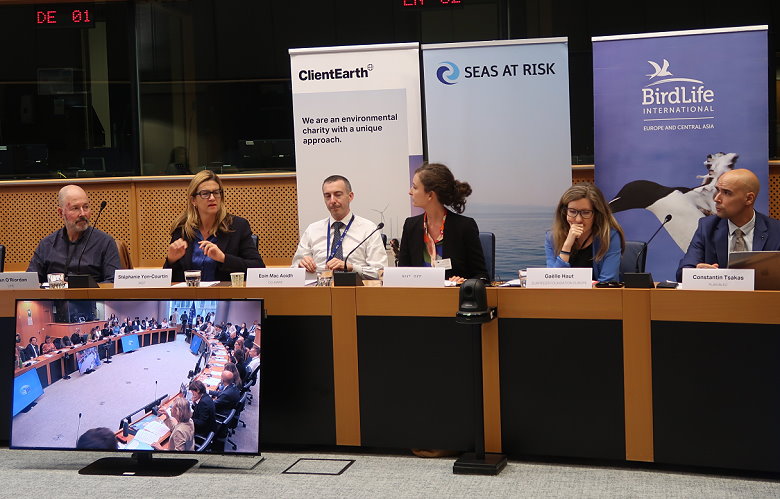
Opening remarks by MEP Stéphanie Yon-Courtin with, to her left, Brian O’Riordan, Policy Adviser, Low Impact Fishers of Europe (LIFE Platform). Others from left to right Eoin Mac Aoidh, deputy Head of Unit in DG MARE, the moderator, Gaëlle Haut, EU Affairs Coordinator, Surfrider Foundation Europe, and Constantin Tsakas, Chief Economist, Plan Bleu Méditerranée
In her opening statement, MEP Yon-Courtin recognised the Ocean Pact, officially announced by Ursula von der Leyen at the UN Ocean Conference in Nice, France, in June 2025 as a milestone. She expressed her disappointment though with the fact that specific funding for fisheries, currently managed through the EMFAF to the tune of €6 billion, was scaled down to €2 billion and merged with agriculture and regional development funds. Estimating that a majority of MEPs were against the current MFF proposal, she demanded that the forthcoming budget negotiations should result in
- ring-fencing more funding for the transition of fisheries, aquaculture and maritime affairs in line with recovery objectives
- an ambitious level of funding to ensure the credibility of the Ocean Pact
- access modalities in favour of small-scale fisheries financial support and allocation of catch quota
- simplification of the rules for decarbonising the fleet.
Eoin Mac Aoich, deputy Head of Unit D3 of the Commission’s DG MARE, submitted that the basic concept of the MFF proposal was to replace 52 thematic funding mechanisms with a more integrated approach across fewer programmes. The same ‘do no harm’ criterion should be used across all sectors. € 865 billion, or 44% of the overall budget, should be managed by EU Member States under the heading ‘National and Regional Partnership Plans’ (NRPs). These plans would not only entail the possibility for some fisheries funding, of which €2 billion were ring-fenced, but also cover such support activities as data collection, technological innovation and more.
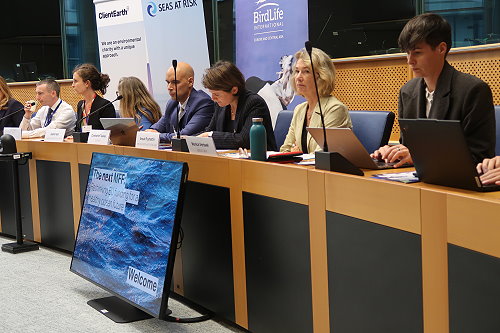
Panelists in the dialogue about the EU Commission proposal for a new MFF 2028-2034
Gaëlle Haut of the Surfrider Foundation Europe admonished that the ocean’s health was at historically low levels, as human activities were provoking climate change and thus ocean warming, reduction of oxygen levels, acidification, worrying degrees of pollution, habitat destruction, and more. Yet, as far as the EU was concerned, despite having the largest Exclusive Economic Zone of the Planet, the ocean barely figured in the MFF proposal.
She proposed to start rectifying this mismatch by eliminating harmful fisheries subsidies for good and reallocating resources to regenerative measures. Blue carbon markets were not an appropriate instrument because of high levels of fraud and low or zero improvements from similar efforts in the past.
Gaëlle Haut reminded the participants of the warnings contained in the just published Copernicus report about the sorry state of the marine environment. It was clear that regenerating the ocean must not be seen as a cost, but an investment towards a healthier future. Therefore, the LIFE Programme should not be eliminated, but, if anything, expanded to build on its successes so far. In general, it was essential to align the spending proposals with the political priorities already agreed at international and EU levels.
Brian O’Riordan of the Low Impact Fishers of Europe (LIFE Platform) highlighted the strategic importance of small-scale fishers for the future of fish food production that needed political will, a need for a clear funding plan to enable the transition from the current state of neglect, and a delivery mechanism that was fit for purpose in order to keep the current generation of fishers in the job and make it attractive for the next.
Monica Verbeek of Seas At Risk criticised that the current political priorities were strongly tilted in favour of industrial fisheries despite their responsibility for serious environmental damage. Yet, the rule application and money flows were clearly in their favour. A high percentage of the current EMFAF was used for increasing the harm rather than protecting and regenereating threatened biodiversity. She advocated that a significant share of funding should support transitions towards low-impact fisheries.
There is no shortage of ideas for solutions to the current crisis. Two videos with examples of small-scale fishers identification of issues and what should be done about them concretely gave ample food for thought. Paolo Fanciulli, the coastal fisher known for his life-long fight to protect coastal habitats off Tuscany, Italy, through the ‘House of the Fish’ (la Casa dei Pesci), and many others, made concrete proposals how the situation could be turned around.
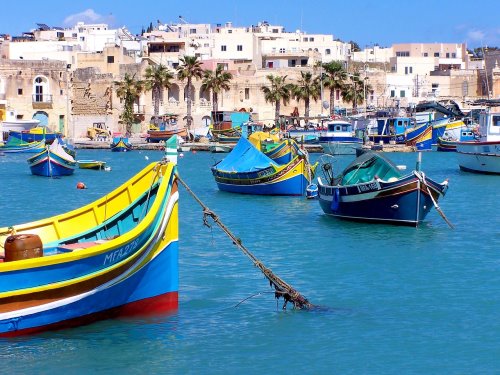
Traditional boats in Malta. Photo Jon Hoefer on Pixabay.
Brian O’Riordan amplified the message by recalling that since 2009 small-scale fishers (SSF) demanded a clear distinction in the market between industrial products and the high quality fish they were selling. This request has remained without answer. Meanwhile, the conditions had deteriorated further and serious efforts at resource and ecosystem regeneration had become a key demand. One step in this direction would be to declare and enforce a 12 nautical mile zone reserved for SSF governed by a co-management scheme.
Constantin Tsakas suggested how the substantial harmful subsidies could be redirected to virtuous objectives, such as improved management, turning paper parks into fully protected areas, training, helping the systematic deployment of selective gears, and, at higher level, enforce the EU Restoration Law.
Monica Verbeek reiterated that the final version of the MFF needed to include a substantial position of restoring ecosystem health, something completely missing in the proposal. If fisheries in Europe were to have a future, ocean and ecosystem health had to be high on the agenda. The goal of protecting 30% of the ocean needed to be backed up concretely with planning and funding.
Anouk Puymartin agreed by demanding that the MFF needed to be aligned with the existing political objectives and that there must be ring-fenced funding for nature and biodiversity protection together with monitoring the progress towards meeting the restoration objectives.
In the concluding statement, MEP Jean-Marc Germain, S&D Coordinator for the EP’s Budget Committee rejected the National and Regional Partnership construction of the MFF proposal in its present form. He also noted that while an aspirational 35% of resources should be climate related, a clear mechanism to ensure delivery was missing and biodiversity was not mentioned at all. He believed that a specific Ocean Fund was necessary to lend credibility to the Ocean Pact. Moreover, the general ‘do not harm’ principle should be anyway the normality, but more specific criteria for spending and supervision were required for actual alignment of spending with existing policy priorities.
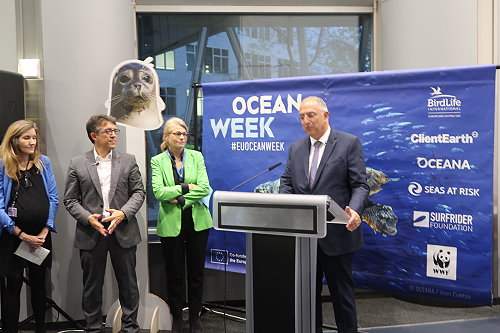
Commissioner Costas Kadis addressing the participants, hosting MEP Christophe Clergeau standing to the left
In the subsequent cocktail and networking event, upon the invitation of MEP Christophe Clergeau, S&D Chair of the Intergroup ‘Seas, Islands, Rivers and Coastal Areas’, participants of the EU Ocean Week listened to summarising addresses of several NGO participants and MEPs.
Commissioner Costas Kadis concluded the round of short speeches expressing his hope to strengthen the prioritisation of ocean and biodiversity regeneration in the negotiation processes for the next MFF.
He announced that the Ocean Pact should be followed by an Ocean Act in 2026 and invited all participants to participate actively in the forthcoming public consultations around ocean and environment protection matters.
Mundus maris will continue its cooperation with the key organisers of the EU Ocean Week and add its efforts towards greater ocean literacy of ordinary citizens so that the political processes get more guidance and engagement in favour of a healthy ocean and priority development of low impact fisheries at the expense of industrial overcapacity and destruction.
Summary and photos by C.E. Nauen.

